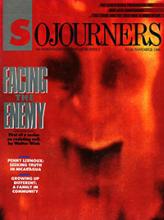In the fall of 1973, Gene Beerens and Faith Apol Beerens founded Christ's Community in Grand Rapids, Michigan. Gene has been a pastor in the Christian Reformed Church for 18 years and is executive secretary of the Community of Communities, an ecumenical circle of Christian communities in the United States. Faith has offered her gifts of pastoral counseling and music to the ministry of Christ's Community.
They are the parents of five children. Kristi, 20, and David, 18, are planning to move to the Washington, D.C. area in early 1987, where they will attend the University of Maryland and relate to Sojourners Community. Lisa, 15, is in 10th grade and plays the violin. Jodi, 9, likes to play softball and sing and is in fourth grade. Jamie, 6, is in first grade and enjoys fishing with his Dad.
The Beerens family has been a friend of Sojourners Community for many years. They have much to offer out of their experience of community, inner-city living, and growing together in faith. Faith, Gene, Kristi, David, and Lisa were interviewed by Joyce Hollyday in their home in Grand Rapids.
-The Editors
Sojourners: How has living in community nurtured you?
David: I think by growing up living in an extended household with several adults, we were always able to relate to an adult on a one-to-one basis. Adults weren't these people who towered over us. It was more a friend-type relationship, and through that we got to have several people whom we related to as we were growing up, not just our parents.
How many years did your family live with other people in your home?
Gene: Our experience began in Terre Haute, Indiana, in January 1971, when Lisa was born, until the fall of 1983. So it was 12-and-a-half years of living this way. It began with a couple of people, and at one point there were 16 people in addition to our natural family.
Read the Full Article

